Love: The Last Chapter
Dominique Keller
2021
| 78 min
English
Awards and Festivals
Official SelectionDOXA Documentary Film Festival, Canada (2021)
Official Selection DocEdge Documentary Film Festival, New Zealand (2021)
Audience Award: Best Documentary FeatureCUFF.DOCS Documentary Film Festival, Canada (2021)
On the outside, it looks like any ordinary seniors’ facility. But on the inside, a series of remarkable love stories is unfolding. With startlingly intimate access, director Dominique Keller follows three different couples as they navigate the delights and challenges of late-in-life romance. Following the daily routines in the facility, Keller peers into the kingdom of old age and brings each couple’s journey into tender focus. Despite health concerns, mobility issues, and interference from concerned families, the need for intimate connection and closeness remains steadfast. Quietly observational, Love: The Last Chapter builds fully embodied portraits of each individual in all of their indelible humanity.
On the outside, it looks like any ordinary seniors’ facility. But on the inside, a series of remarkable love stories is unfolding. With startlingly intimate access, director Dominique Keller follows three different couples as they navigate the delights and challenges of late-in-life romance.
Following the daily routines in the facility, Keller peers into the kingdom of old age and brings each couple’s journey into tender focus. Ruby wants more of a commitment from Victor, who has his own ideas about their relationship. Jim and Dianne are seeking greater independence and a place together, while George and his wife Doreen face end-of-life decisions. Despite health concerns, mobility issues, and interference from concerned families, the need for intimate connection and closeness remains steadfast.
As the seasons pass outside the walls of the facility, the film’s immersion in the quotidian details of life and love offers audiences the opportunity to know these people. Quietly observational, Love: The Last Chapter builds fully embodied portraits of each individual in all of their indelible humanity.
1-LINER AND 2-LINER
Short synopsis
Inside a seniors’ facility, director Dominique Keller follows three couples as they navigate the complexities of late-in-life relationships. Revealing the importance of intimate connections, this observational film builds fully embodied portraits of each individual in all of their indelible humanity.
One-liner
A portrait of three different couples in a seniors’ facility as they navigate the delights and challenges of late-in-life romance.
Interview with Dominique Keller
What made you want to tell this story in the first place?
I was very curious about aging, about getting older. As a society, we tend to put it out of our minds, but I think we really need to look at it. Ageism is a very quiet “ism,” but we need to look at our elders with a better media lens and practice. Even before the pandemic, media images of the elderly were often very dehumanizing and not relatable. I think that because of this, ageism is on the increase.
What was it like to actually live in the seniors’ facility for one month and visit regularly through the rest of the year?
Living with my subjects changed everything about how I both viewed them and how I allowed them to tell their story. Before I lived in the facility, I was comfortable in my own independence.
I had the freedom to come and go as I pleased. The food they ate looked pretty good, and I was impressed by the array of programs available. Moving into the lodge, I had to agree to sign out whenever I left the building and to sign out for any meals I was missing. I was handed the menu for the month. I ate three meals a day there and all of my nutritional choices were no longer my own.
I would eat what was served. It seems like a small thing, but it’s hard to lose small pieces of your freedom and independence. I remember unpacking my bags and lying down in my single bed. Light came in through the crack under the door from the hallway. I could hear people moving around outside. I laid awake in bed all night, wondering if anyone would even check on me, if I would actually make any friends, and if I had made the biggest mistake of my life.
I really wanted to understand the core struggle. But being embedded in the facility, even for a month, really affected my sense of identity. That first evening I actually had a little meltdown!
It took a few weeks to acclimatize. I followed all the rules of the facility, signing in and out, and I ate all my meals there and took activity classes. I slept there every night. I spent a lot of time in the residents-only area, because I really wanted to be part of the community.
How do you think living with your subjects changed both your view of seniors and how you told their story?
Living with my subjects allowed me to experience as close as possible, firsthand, what it means to enter the last chapter of life and to leave so much behind: career, material belongings, sometimes friends and family. I saw how many little freedoms and choices were taken away. Because of this realization I vowed to allow my subjects to have much more power and autonomy in the storytelling process. I chose to film in an observational style because this style takes the filmmaker as much as possible out of the storytelling process and allows the subjects more power to tell their own story.
You didn’t use any narration or music to guide your story and mostly relied on locked-off static shots. What was your thinking around using this approach to documentary filmmaking?
I’ve slowly been moving towards more observational filmmaking, as I think it allows the subjects to really tell their own stories. When you take out narration and music, even if it becomes more challenging, there is a truth there. It’s important to ask difficult questions and to allow for greater audience immersion and impact, because that authenticity comes through.
In making this film, I felt a degree of responsibility, as this is a group of people, the elderly population, who really face discrimination. It is difficult to face mortality. We’re here for a very short time on the planet and it’s difficult even to spend a few moments contemplating old age.
What do you want people to understand about the challenges and necessity for intimacy among seniors?
As you age, you lose your freedom. You leave behind your house, your car, your career, the pieces that make up your identity; these things slowly leave, but the last thing is really the need for human connection. That never really goes away. We need to love and to be loved. This is never more true or more necessary than in the last chapter of life.
Trailer
Excerpt 1: The wedding
Excerpt 2: Higher care
Excerpt 3: 44 Years together
Images
Loading...
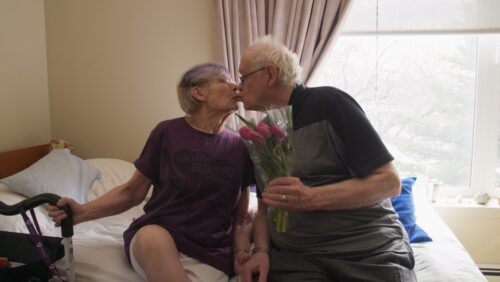 Photo: NFB, Keller Media
Photo: NFB, Keller Media
Download
Loading...
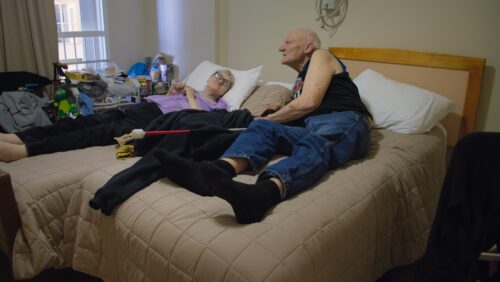 Photo: NFB, Keller Media
Photo: NFB, Keller Media
Download
Loading...
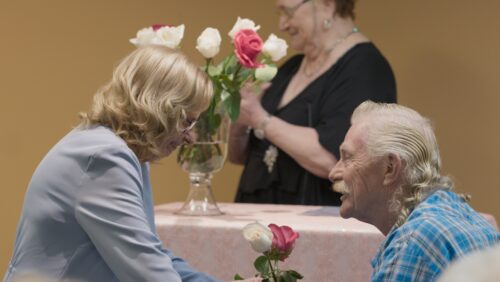 Photo: NFB, Keller Media
Photo: NFB, Keller Media
Download
Loading...
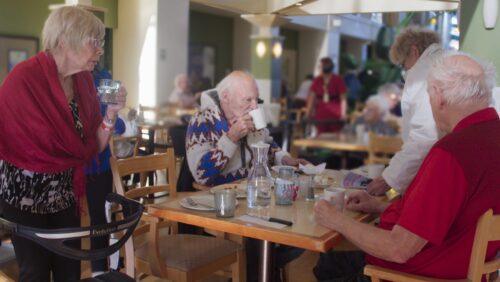 Photo: NFB, Keller Media
Photo: NFB, Keller Media
Download
Loading...
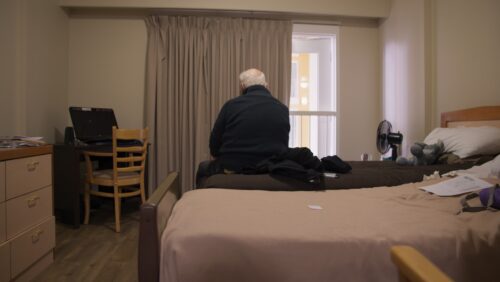 Photo: NFB, Keller Media
Photo: NFB, Keller Media
Download
Loading...
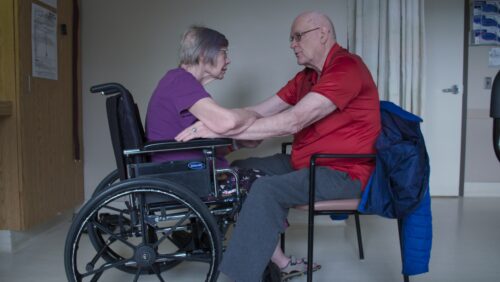 Photo: NFB, Keller Media
Photo: NFB, Keller Media
Download
Loading...
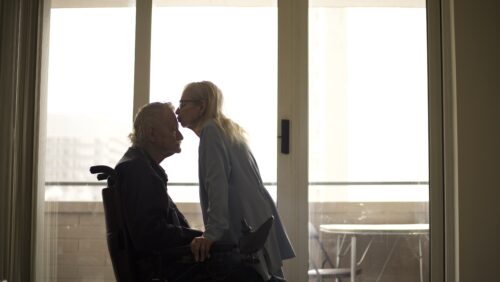 Photo: George Webber // NFB, Keller Media
Photo: George Webber // NFB, Keller Media
Download
Loading...
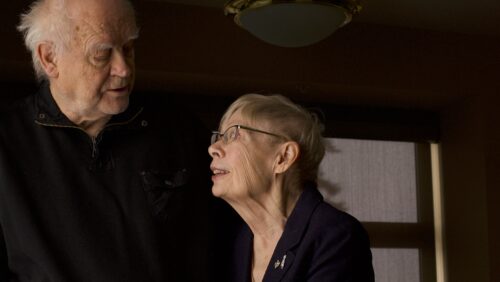 Photo: George Webber // NFB, Keller Media
Photo: George Webber // NFB, Keller Media
Download
Loading...
 Photo: George Webber // NFB, Keller Media
Photo: George Webber // NFB, Keller Media
Download
Promotional Material
Film Website
Team
Dominique Keller
Writer, Director, Producer and Executive Producer (Keller Media)
Photo
Photo : Louie Villanueva
Karen Pickles
Producer (Keller Media)
Photo
Coty Savard
Producer (NFB)
Photo
Photo : Conor McNally
David Christensen
Producer/Executive Producer (NFB)
Photo
Photo : NFB
Credits
ln memory of Doreen Elliott
Written and Directed by
Dominique Keller
Producers
David Christensen
Coty Savard
Karen Pickles
Dominique Keller
Executive Producers
David Christensen
Dominique Keller
Edited by
Brenda Terning
Director of Photography
Dominique Keller
Additional Cinematography
Philip Harrison
Sound Recordist
Dominique Keller
Business Affairs
Karen Pickles
Impact Producer
Jackie Garrow
Production Accounting
CJ Robertson
Assistant Editor
Janet Savill
Additional Editors
Dean Evans
Paul Mortimer
Production Assistant
Anett Meszaros
Music Clearances
Elizabeth Klinck
For the NFB
Marketing Manager
Kelly Fox
Publicist
Katja de Bock
Still Photographers
George Webber
Robert Zawaski
Studio Operations Manager
Darin Clausen
Studio Administrator
Devon Supeene
Production Coordinators
Hilda Amponsah
Faye Yoneda
Tanis Redcrow
April Dunsmore
Janet Kwan
Production Supervisor
Esther Viragh
Head of Business Affairs
Mary Graziano
Legal Counsel
Christian Pitchen
For Super Channel
Donald Wl McDonald
President & CEO
Jackie Pardy
Chief Content Officer
For Accessible Media Inc.
John Melville
VP, Content Development and Programming
Brian Perdue
Director, Programming
Audio Post Production
Propeller Sound Studios Inc.
Sound Supervisor
Frank Laratta
Sound Design and Dialogue Editor
Paul Schreve
Sound Effects Editor
Chris Ferguson
Foley Artist
Thomas Geddes
Assistant Sound Editor
Vienna Kunnas
Re-Recording Mixers
Paul Schreve
Chris Ferguson
Audio Post Producer
Braun Farnon
Picture Post Services
Jump Studios Ltd.
Post-Production Manager
Brian Vos
Post-Production Supervisor
Jennifer Avis
Senior Colorist
Jeff August
Colorist
Nick Zacharkiw
Digital FX
Nick Zacharkiw
Broek Roberts
Titles and Credits
Broek Roberts
Additional Digital FX
Moonhauzen Studio
Dmitriy Barchishak
Roman Sylchenko
Tolga Burcak
Legal
Juliet Smith, Dentons Canada LLP
lnsurance
Front Row lnsurance Brokers
On screen participants
Ruby Houston
Doreen Elliott
Dianne Bent
Jim Bent
George Elliott
Victor A. Svinth-Lassen
Additional Music by
Jeff Stockton
Produced with the participation of the Canada Media Fund
Made possible through the Alberta Provincial Tax Credit Program
Produced in association with Super Channel
With the participation of Canadian Film or Video Production Tax Credit
With the assistance of the HotDocs Ted Rogers Fund
In association with Accessible Media Inc.
and with the assistance of GoodPitch Vancouver
Alberta Foundation for the Arts
Director’s Guild of Canada
Writer’s Guild of Canada
A Keller Media Inc. and National Film Board of Canada co-production
© 2020 Keller Media Inc. and the National Film Board of Canada
Media Relations
-
About the NFB
For more than 80 years, the National Film Board of Canada (NFB) has produced, distributed and preserved those stories, which now form a vast audiovisual collection—an important part of our cultural heritage that represents all Canadians.
To tell these stories, the NFB works with filmmakers of all ages and backgrounds, from across the country. It harnesses their creativity to produce relevant and groundbreaking content for curious, engaged and diverse audiences. The NFB also collaborates with industry experts to foster innovation in every aspect of storytelling, from formats to distribution models.
Every year, another 50 or so powerful new animated and documentary films are added to the NFB’s extensive collection of more than 14,000 titles, half of which are available to watch for free on nfb.ca.
Through its mandate, its stature and its productions, the NFB contributes to Canada’s cultural identity and is helping to build the Canada of tomorrow.